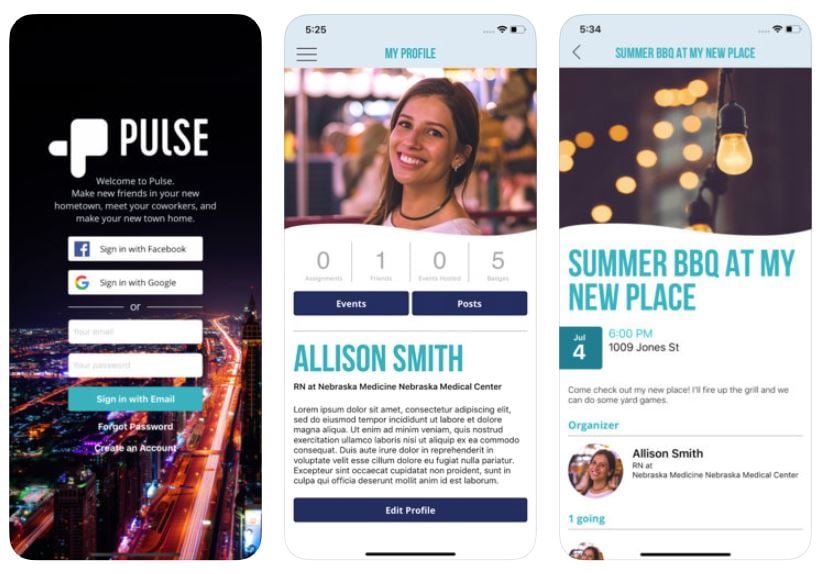 We’re all guilty of it. Maybe you just spent a few weeks working nonstop or on call. Working in the healthcare industry can have you taking some lengthy or late hours. Maybe you’ve had other obligations taking up all your free time. Life can sometimes get in the way of keeping up with your friends. There’s grocery shopping and bill paying and kids and work events and odd shifts and family commitments. So, it can be easy to let some things slide...
We’re all guilty of it. Maybe you just spent a few weeks working nonstop or on call. Working in the healthcare industry can have you taking some lengthy or late hours. Maybe you’ve had other obligations taking up all your free time. Life can sometimes get in the way of keeping up with your friends. There’s grocery shopping and bill paying and kids and work events and odd shifts and family commitments. So, it can be easy to let some things slide...
It's sure hard being a good friend!
You may feel like that missed call or lapsed text message isn't a huge deal in the grand scheme of things. A missed phone call here and there to catch a few quick hours watching Netflix in your sweatpants can add up. After a long week, you may feel like your "me time" is always lingering on the verge of extinction. Sadly, the first thing to suffer are your friendships.
A recent study showed that men and women make strong connections in their youth, but as we all age, the number of people we consider friends or stay in contact with decreases once we hit our late 30s. Young adults tend to prioritize their careers and romantic relationships over increasing their social circle count and cultivating new friends. When you add traveling into the mix, plus a busy medical career, and the need to decompress from your day, it can be understandably exhausting to keep up with social obligations and updates.
Maintaining friendships and making time for family is still important though. Research shows that bonding with friends is important to both physical and mental health. Socializing boosts your happiness and self-worth levels, helps you cope with trauma, reduces stress, and increases your sense of purpose. Additionally, a study by AARP estimated 42.6 million Americans over the age of 45 suffer from chronic loneliness, which raises the risk of premature death. It's a loneliness epidemic.
But you don't want to be lonely! These people are your crew! They're in your corner and have your back through everything, so it’s nice to reciprocate and show them how important they are to you.
...So, how do you be a good friend?
Maintaining Friendships When You’re A Traveler
 Gather a crowd.
Gather a crowd.
Time is everything these days. Especially when you’re traveling, you need to find good ways to expand upon your free time. You may have limited time at home or in cities where you’re visiting, so this means limited time to hang out with your friends. (...Hmm, a conundrum.) But, don’t worry! You can make the most of your social life by seeing everyone at the same time! Try hosting a big dinner party, or invite everyone out to lunch, to a park, or on a big adventure to learn more about your city and the culture. You can see everyone in your area in one fell swoop. If large gatherings aren't your thing (some of us are definitely better at being solo friends) or you worry not everyone will jive with each other, try splitting up time into sub-groups based on interests and like-minded personalities. Your art gallery friends might appreciate the extra museum time, while your hiking pals will want the afternoon to really explore their surroundings. Catering to your friends' interests can help people stick together in their hobbies.
 Also, get some one-on-one time.
Also, get some one-on-one time.
Equally, make sure you balance out your big events with small hangs with your friends. Some people aren't big into being part of a crowd and really value their close-knit time with you. If you can’t get around to some chatting time with everybody, don’t feel guilty. Not everyone is that one-on-one type of friend either. If you missed out a solo hang with one of your besties, schedule a coffee date or some other form of one-on-one time. Sometimes the day can get away from us and it's important to hone in on those really special friends you want to spend a little extra time with.
 Keep it consistent.
Keep it consistent.
We all have the kind of friends that would prefer a random hang sesh to sticking something on a calendar for a later date. Hey, you might even be one of those people too! It’s a lot harder to keep those last-minute plans in the mix, but you don't have to sacrifice your whims and free-spirited attitude. Just recognize the different personalities of your friends (or yourself) and be accommodating. You can also start making a weekly or bi-weekly date with your friends that would prefer a little more heads up. (Because we all have those kinds of friends too.) If you’re currently a traveler, that distance could really be a key factor in how often you get to see or speak to your friends in other places. Keeping a routine in this case may benefit your friendship, especially when you're juggling distance in addition to your free time.
*On a personal note: the majority of my close friends and I no longer live in the same city, but we plan weekly and monthly days and times to update each other on our lives. I know I can always count on that weekly phone call at 7pm on Tuesdays, or the annual vacation we take together, and it's always something to look forward to.
 Make a gesture.
Make a gesture.
Sometimes a small gesture can mean the world to a friend. When you're miles away, you don't always know what their day-to-day has been like. Additionally, if they're going through a rough time and could really use a friend right now, not everyone is in the habit of reaching out for emotional support on their own. Whether it’s a card in the mail just to say hey, or a quick text with a funny meme texted to them, you could very well make their whole day. Equally, big life events—happy and sad—will happen no matter where you are. If a friend is celebrating something big (like a birthday or new life milestone) or mourning a loss of a loved one, maybe they’d appreciate a surprise visit. If an impromptu visit isn't possible, send flowers or a gift to show them you’re thinking of them from afar. Making time to show your friends you care can help curb the distance between you.
 Quality over quantity.
Quality over quantity.
It's great to create a large group of friends, but let's be honest: not ALL of them can be besties with you, right? What exactly is a healthy number when it comes to friends? According to a Gallup poll, Americans have about nine close friends, on average, not including relatives. If you have a huge posse to hang around that doesn't mean you have to start making cuts like it's "Friend Olympics Tryouts Week"; some friends are fun to have for casual events, without the close, secret-telling factor. Having a ton of friends is great! Just be sure to really nurture your prized, close friendships. Those select few are your diamonds in the rough and will be there to listen and support you through thick and thin.
 Get social.
Get social.
These days, social media can be a communication lifesaver. It’s so easy to tap your phone screen and instantly connect with hundreds of people all over the world. (Oh, the modern days of technology!) So, while you're out there livin' your best travel life, use that social media account to your advantage and engage with your friends and family this way. Post photos of your traveling adventures on Instagram, jot down your day-to-day thoughts on Twitter, stay updated with Facebook, and chat one-on-one through Messenger. Whatever your social media outlet, and whatever funny meme you feel like sending their way, it's a good way to keep your friends updated on your life while bridging the distance between you.

There’s a whole lot more apps out there to help you stay in the loop too. Pulse is a social app made specifically for medical travelers, so you can connect with each other while on an assignment. There are different features to get you connected with new friends and colleagues, and you can host and attend meetups, seminars, parties, conferences.
Pulse is available on the App Store and on Google Play. Get to downloading and adding your friends, so you can build your community where you are!
Most of all, friendships no matter how near or far, require understanding and patience. The level of closeness you feel from friends may ebb and flow over the years, and some can even falter from time and distance. It's important to remember that this is completely natural. As a traveler, you have a unique opportunity to make new friends in different places you take assignments in, which can easily turn into long-distance friendships to maintain. These tips should help you find time to spare for your old, cherished friends and make room for new ones that could be come just as cherished too.




